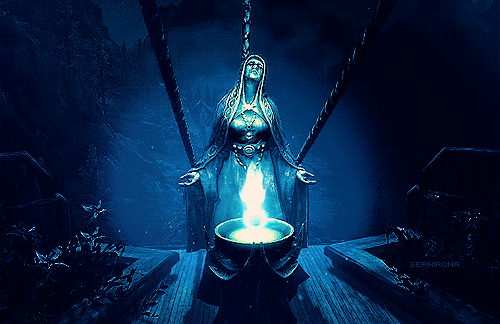Asteria
Titan goddess of the stars, prophetic dreams and necromancy.
"Hail. O heaven-built isle, most lovely scion of the children of bright-haired Leto, O daughter of the
sea, thou unmoved marvel of the spacious earth, by mortal men called Delos, but by the blessed gods
of Olympus known as the far-seen star of the dark-blue earth".
Pindar, Processional Song on Delos (trans. Sandys)
The Goddess Hekate’s mother was often given as the Titan Goddess Asteria, meaning 'starry one' or 'of the stars', also 'falling star' due to the myth of her pursuit by Zeus, where she fell to earth from the heavens to become the Island of Delos, the probable origins of the word asteroid.
She was the wife of the Titan God of war and destruction, Perses and sister of the Goddess Leto, the mother of Apollo and Artemis. She appears in Hesiod’s Theogony as "Asteria of happy name, whom Perses once led to his great house to be called his dear wife. And she conceived and bare Hekate whom Zeus the son of Kronos honoured above all". Asteria was the Goddess of the oracles and prophecies of the night, such as prophetic dreams, astrology, and necromancy (communication with the dead.) She was also closely associated with the protogenic Goddess of Night, Nyx.
Nyx and Erebus (darkness) are sometimes given as Hekate's alternative parentage. According to the poems of Orpheus, Nyx occupies a cave like her daughter Hekate, in which she gives oracles. Her twin sons Thanatos (death) and Hypnos (sleep) could be said to represent the night as a liminal realm between the worlds of life and death, hence the idea of receiving oracles and prophecies during the night in dreams and from the dead who have access to the spirit world.
In the myth after the fall of the Titans, Asteria fled the advances of Zeus, tricking him by turning herself into a quail. Zeus pursued her as an eagle but she further outwitted him by leaping into the sea and becoming an island, ever wandering, to escape the pursuit of the God Poseidon who then took up the chase.
Zeus turned his attentions to Asteria's sister Leto, whose veiled beauty he glimpsed accidently, and it was on Delos Leto found refuge from the jealous Goddess Hera, to give birth to her divine offspring Artemis and Apollo. From Callimachus, Hymn 4 to Delos, "And Hera was grievously angered and spake … But against Asteria am I not wise angered for this sin, nor can I do to her so unkindly as I should–for very wrongly has she done a favour to Leto. Howbeit I honour her exceedingly for that she did not desecrate my bed, but instead of Zeus preferred the sea".
The name Delos means 'to emerge from water' a reference to the seabed which under the protection of the unborn Apollo, rose up to root the island. There was no agriculture on Delos, it was mostly barren, but it became wealthy and was celebrated as Apollo’s birth place, with a temple built on the Island to the God.
The Goddess Asteria was often shown in Greek vase paintings with the other Delion divinities, Leto, Artemis and Apollo. According to Pliny the Elder, some of the older names of Delos also include the very Hekatean Cynethus meaning Dog Island, and Piriyple, Fire Island, because fire was first discovered there. The women of Delos also worshiped an ancient Goddess Brizo (to slumber) who could also be associated with Asteria, being a Goddess of prophetic dreams and in common with Hekate, a protector of mariners, sailors and fishermen.
The mother of Asteria was Phoibe (or Phoebe) a Titan moon Goddess associated with the Greek word phobos meaning 'bright' or 'radiant' and 'to give prophecy'. She was the third goddess after Gaia and Themis to hold the Oracle of Delphi, which she gifted to her grandson Apollo on his birthday. Her father Koios (Coeus) meaning 'query' or alternatively 'Polos' (of the northern pole) was Titan god of the axis of heaven around which the constellations revolved, and was probably a god of heavenly oracles, just as his wife Phoibe presided over the oracles of the axis of earth at Delphi.
Together, the couple may have functioned as the primal font of all knowledge. It could be said that Asteria and her sister Leto presided over the two main branches of prophecy, Leto and her son Apollo presided over the prophetic power of light and heaven, whereas Asteria and her daughter Hekate presided over the prophetic powers of night, chthonian darkness and the ghosts of the dead.
There is little written about the physical appearance of the Goddess Asteria but interpreting the myths, in contrast to her sister Leto who is described as 'dark gowned' meaning she was covered or veiled, and could also according to Antoninus Liberalis, appear in the guise of a she-wolf, Asteria’s beauty was visible, aspirational, and radiant and ultimately unobtainable, like the stars in the sky but like them had a powerful yet distant effect on destiny.
[1]













